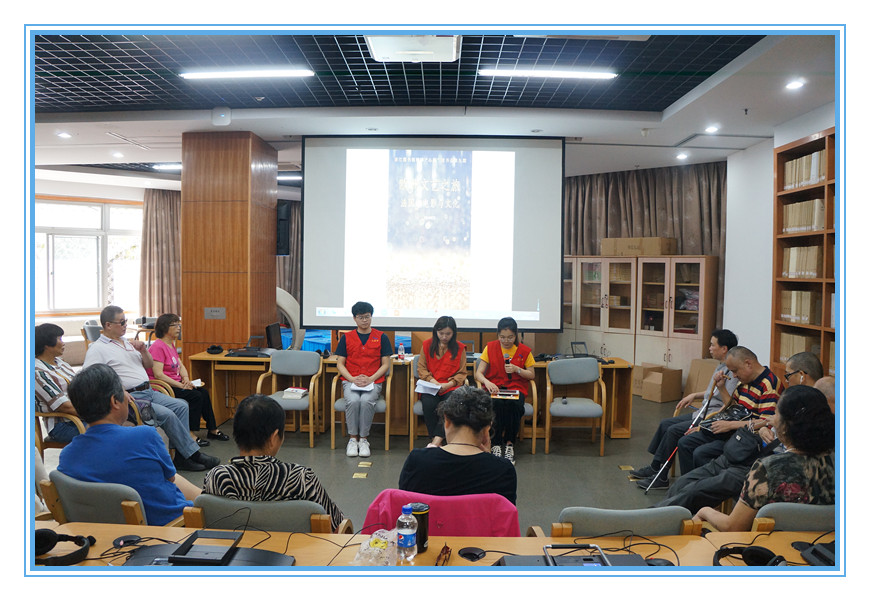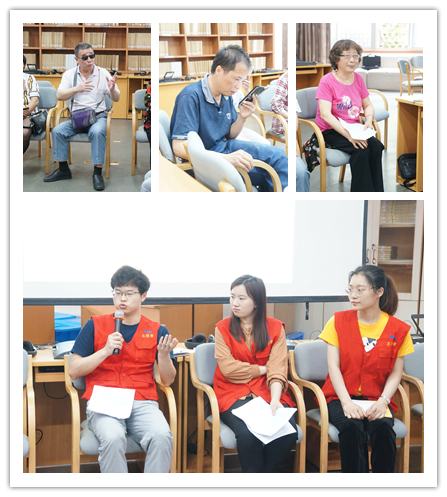 pub:Zhejiang Library
pub:Zhejiang Library  time:2019/05/27
time:2019/05/27  count:57
count:57
“When talking about France, what’s the first thing that comes to your mind?” On May 26, the Visual Impaired Center of Zhejiang Library held the ninth reading conference of “mind reading” for visual impaired people, and three volunteers of Zhejiang Library’s “Aiding the Visually Impaired” team asked the above question.
“Romance!” the 13 visually impaired readers attended the activity said simultaneously. France is indeed a country well-known for its romance, which is reflected in its beautiful landscape, splendid art, brilliant culture, delicious wine, and leisurely life.
This year marks the 55th anniversary of the establishment of diplomatic ties between China and France. Under the Belt and Road Initiative proposed by present Xi Jinping, China and France hold up the banner of mutual benefit and win-win cooperation between China and France based on principles of openness, inclusiveness, and pursuing human progress. On May 10, the audio description of French film The Chorus guided people with sight disability to appreciate the French-style classic work, which opened the in-depth discussion of French culture and art.
The reading conference focused on films of Amelie from Montmartre and The Chorus. Du Rongxiu, a volunteer, introduced in detail the plot of the two films and their themes of “freedom, equality, and fraternity”. In particular, The Chorus aroused resonance among many readers during the discussion.
Zhuang Yan, a reader, recalled the story of The Chorus: at first Mr. Mathew was teased by these naughty children. As he continues to treat those children sincerely, they are gradually affected, feel love and warmth of the world, and respect and love this teacher from the bottom of their heart. This kind of emotional harmony between teacher and students is really touching, and it deserves to be an excellent film; Zhang Zhihong remembers the music in The Chorus clearly, and the melody of the movie echoes in her mind whenever she talks about this film. Marx said that music is the second language of human beings, and The Chorus can also be considered as a masterpiece that redeems human nature with music. During the conference, volunteers played the chorus of the choir, voissur ton chemin, and everybody was intoxicated in the heavenly voice.
The orphan Pépinot in the film is also an impressive character. Every weekend, he waits at the school gate for his parents to pick him up, but they will never come. “Do you know why the movie sets up the role of Pépinot? Why the movie repeatedly emphasizes his waiting for his parents every week?” Films often tell stories based on the history and society of their own countries, and tend to bear the brand of their own culture and history. “When we see the film from another point of view, we can see the social reality of that time conveyed by the film.” Volunteer Cao Hui added, “The story of The Chorus happened in early postwar France, and Pépinot’s parents died during the German occupation of France in the Second World War.” Cao Hui then described in detail the tortuous history of France during the two world wars, which were lasting from 1870 to 1944. In his narrative, history slowly unfolded like a long scroll.
The visually impaired readers Zhang Weizhong and Lou Jindi also expressed their impressions of France. Zhang Weizhong is very familiar with the national territorial area, geographical location, international status, famous buildings and other features of France, while Lou Jindi has a deep impression of many French literary giants, such as Hugo, Dumas, and Balzac. “When you talk about French attractions, what is it that most easily be ignored but least should be ignored?” Another volunteer Liu Yan continued, “I think it is coffee shop, which can be said to have created the modern literature history of France. It has been known for centuries that there is an indissoluble bond between coffee houses and French literature.” Liu Yan then talked about French literature, philosophy, art schools, as well as one of the founding fathers of stream of consciousness writing, Remembrance of Things Past. The two hours’ tour of French literature and art was far from being enough. Let’s look forward to our next reading.

